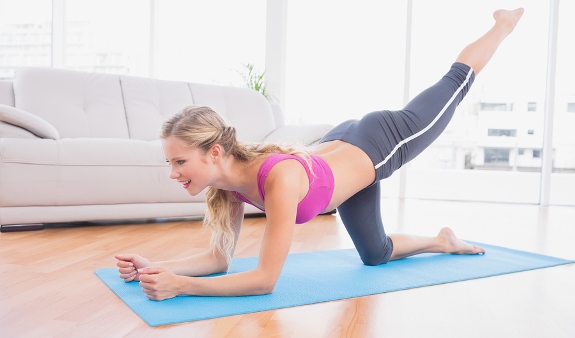
The Pilates style of exercising was developed by Joseph Pilates in the early 20th century. It is yoga-based from the fact that Pilates believed the mind and body are interrelated. It is also a lot like yoga in that it requires an intense focus on breathing and doing each exercise correctly.
Pilates movements work the abdominal core – in particular the abdomen, back, hips, buttocks and inner thighs. From here, exercises move (or as Pilates called it “flows”) outward toward the extremities. The real value of this form of fitness is the goal of precise and perfect execution of each exercise, verses a half-hearted attempt – hence the intense focus on the task at hand.
Another similarity to yoga is breathing control. In Pilates, the person exercising forcible exhales in order to get maximum draw on the inhale. The forced exhale clears the lungs of carbon dioxide and gets the maximum amount of oxygen back into the lungs on the inhale. More oxygen in lungs means more oxygen getting to the cells, a process Pilates saw as “cleaning and invigorating”.
Pilates exercises themselves strengthen muscles, increase flexibility, decreases stress levels and improves overall health. Because the exercises performed are low-impact and relatively safe, people of all ages and fitness levels can participate.
As much as Pilates is, what it isn’t is:
- Cardio training
- Strength training
Because of these limitations, Pilates should be a supplement to an overall well-rounded fitness program that does include both strength and cardio training.
The Pilates program is also used by many physical therapists as part of rehabilitation programs that include recovering from knee surgery, back problems, hip replacement, as well as managing scoliosis, arthritis and osteoporosis. There are also specialty programs geared toward golfers, runners and equestrians. Pilates truly does have something for everybody.
Different types of classes are usually available. While some forms use only an exercise mat, others forms use or incorporate the use of specialty machines. If you choose to do Pilates from the comfort of your home, choose a DVD program that uses just an exercise mat.
If you choose to take classes at a fitness studio, be prepared to pay around $10 and up for classes – similar to what you would pay for Zumba, Jazzercise or yoga. Pilates may be included at no additional cost with some gym memberships.
Pilates is a great addition to your existing fitness program and will take your fitness level to a new and higher level.
